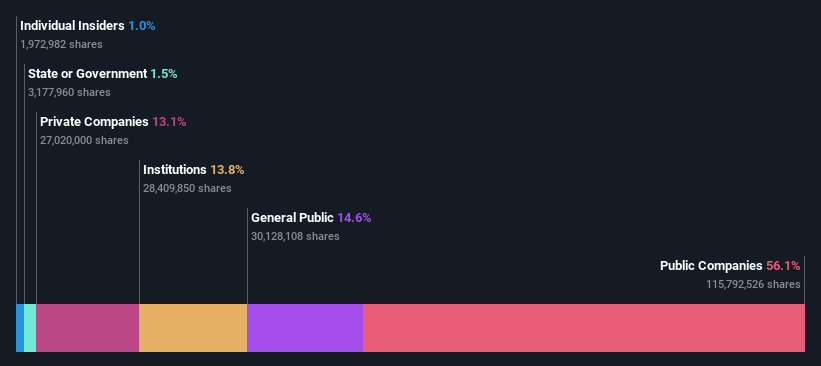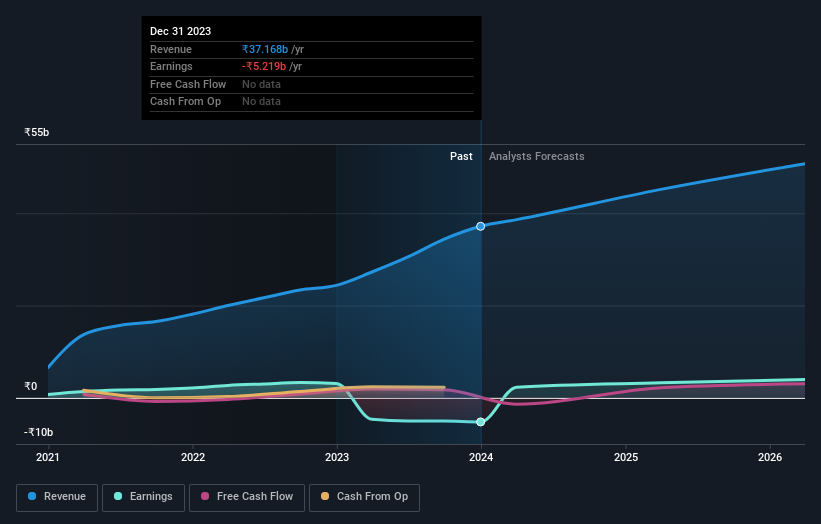- India
- /
- Basic Materials
- /
- NSEI:RHIM
RHI Magnesita India Limited's (NSE:RHIM) largest shareholders are public companies who were rewarded as market cap surged ₹6.6b last week

Key Insights
- Significant control over RHI Magnesita India by public companies implies that the general public has more power to influence management and governance-related decisions
- 56% of the company is held by a single shareholder (RHI Magnesita N.V.)
- 14% of RHI Magnesita India is held by Institutions
To get a sense of who is truly in control of RHI Magnesita India Limited (NSE:RHIM), it is important to understand the ownership structure of the business. With 56% stake, public companies possess the maximum shares in the company. Put another way, the group faces the maximum upside potential (or downside risk).
Clearly, public companies benefitted the most after the company's market cap rose by ₹6.6b last week.
Let's delve deeper into each type of owner of RHI Magnesita India, beginning with the chart below.
See our latest analysis for RHI Magnesita India

What Does The Institutional Ownership Tell Us About RHI Magnesita India?
Institutional investors commonly compare their own returns to the returns of a commonly followed index. So they generally do consider buying larger companies that are included in the relevant benchmark index.
As you can see, institutional investors have a fair amount of stake in RHI Magnesita India. This implies the analysts working for those institutions have looked at the stock and they like it. But just like anyone else, they could be wrong. If multiple institutions change their view on a stock at the same time, you could see the share price drop fast. It's therefore worth looking at RHI Magnesita India's earnings history below. Of course, the future is what really matters.

We note that hedge funds don't have a meaningful investment in RHI Magnesita India. RHI Magnesita N.V. is currently the largest shareholder, with 56% of shares outstanding. With such a huge stake in the ownership, we infer that they have significant control of the future of the company. Dalmia Bharat Refractories Limited is the second largest shareholder owning 13% of common stock, and Axis Asset Management Company Limited holds about 2.3% of the company stock.
While studying institutional ownership for a company can add value to your research, it is also a good practice to research analyst recommendations to get a deeper understand of a stock's expected performance. While there is some analyst coverage, the company is probably not widely covered. So it could gain more attention, down the track.
Insider Ownership Of RHI Magnesita India
While the precise definition of an insider can be subjective, almost everyone considers board members to be insiders. Management ultimately answers to the board. However, it is not uncommon for managers to be executive board members, especially if they are a founder or the CEO.
Insider ownership is positive when it signals leadership are thinking like the true owners of the company. However, high insider ownership can also give immense power to a small group within the company. This can be negative in some circumstances.
Our information suggests that RHI Magnesita India Limited insiders own under 1% of the company. We do note, however, it is possible insiders have an indirect interest through a private company or other corporate structure. Keep in mind that it's a big company, and the insiders own ₹1.3b worth of shares. The absolute value might be more important than the proportional share. It is good to see board members owning shares, but it might be worth checking if those insiders have been buying.
General Public Ownership
The general public, who are usually individual investors, hold a 15% stake in RHI Magnesita India. While this group can't necessarily call the shots, it can certainly have a real influence on how the company is run.
Private Company Ownership
It seems that Private Companies own 13%, of the RHI Magnesita India stock. Private companies may be related parties. Sometimes insiders have an interest in a public company through a holding in a private company, rather than in their own capacity as an individual. While it's hard to draw any broad stroke conclusions, it is worth noting as an area for further research.
Public Company Ownership
Public companies currently own 56% of RHI Magnesita India stock. It's hard to say for sure but this suggests they have entwined business interests. This might be a strategic stake, so it's worth watching this space for changes in ownership.
Next Steps:
It's always worth thinking about the different groups who own shares in a company. But to understand RHI Magnesita India better, we need to consider many other factors. Consider risks, for instance. Every company has them, and we've spotted 1 warning sign for RHI Magnesita India you should know about.
But ultimately it is the future, not the past, that will determine how well the owners of this business will do. Therefore we think it advisable to take a look at this free report showing whether analysts are predicting a brighter future.
NB: Figures in this article are calculated using data from the last twelve months, which refer to the 12-month period ending on the last date of the month the financial statement is dated. This may not be consistent with full year annual report figures.
New: AI Stock Screener & Alerts
Our new AI Stock Screener scans the market every day to uncover opportunities.
• Dividend Powerhouses (3%+ Yield)
• Undervalued Small Caps with Insider Buying
• High growth Tech and AI Companies
Or build your own from over 50 metrics.
Have feedback on this article? Concerned about the content? Get in touch with us directly. Alternatively, email editorial-team (at) simplywallst.com.
This article by Simply Wall St is general in nature. We provide commentary based on historical data and analyst forecasts only using an unbiased methodology and our articles are not intended to be financial advice. It does not constitute a recommendation to buy or sell any stock, and does not take account of your objectives, or your financial situation. We aim to bring you long-term focused analysis driven by fundamental data. Note that our analysis may not factor in the latest price-sensitive company announcements or qualitative material. Simply Wall St has no position in any stocks mentioned.
About NSEI:RHIM
RHI Magnesita India
Engages in the manufacture and trading of in refractories, monolithics, bricks, and ceramic paper in India and internationally.
Excellent balance sheet average dividend payer.
Market Insights
Community Narratives




